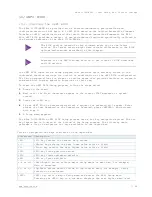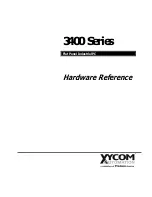
KBox C-103-NGSF - User Guide, Rev. Proof of Concept
www.kontron.com
// 80
11.4.
Power Supply Specification
Before connecting the product to a mains power supply, ensure that the power supply
meets the required electrical specification for the product and that protection and
supply limitation have been taken into consideration. The power supply used must also
automatically recover from AC power loss and start up under peak loading.
Connect the product only to a power supply desiged to achive NEC Class-2 and Limited
Power Source (LPS).
Table 15: KBox C-103-NGSF-x Electrical Specification
Nominal Input Voltage
24 VDC
Input Voltage Range
17 VDC to 36 VDC
Input Current
6.0 A max.
Inrush Current
10 A max. ( at 17 VDC)
Power
140 W (max.)
Observed that wiring and short-circuit/overcurrent protection is
performed according to the applicable standards, regulations and in
respect to the product’s electrical specification. The disconnecting
device (fuse/circuit breaker) rating must be in accordance with the
product’s wire cross-section
Only connect to an external power supply delivering the specified
input rating and complying with the requirements of Safety Extra Low
Voltage (SELV) and Limited Power Source (L.P.S.) of UL/IEC 60950-1 or
(PS2) of UL/IEC 62368-1.
Ensure that the power supply is used according to the manufacturer’s
instructions.
Ensure the power supply has been fully tested to at least meet the
minimum immunity of AC inputs requirements, as stipulated in IEC
55024. Including power supplies marketed with a separate AC/DC power
converter.
11.4.1.
Power Supply Protection Requirements
The used external power supply is required to incorporated protection and supply
features such as over current protection, inrush current protection, over voltage
protection and undervoltage (brownout) protection, to protect the product against
fluctuations and interruptions in the delivered DC power supply.
If an under voltage (brownout) condition occurs,the used power supply
must remain in the “off state” long enough to allow internal voltages
to discharge sufficiently. Failure to observe this “off state” may
mean that parts of the product or peripherals work incorrectly or
suffer a reduction of MTBF. The minimum “off state”, to allow internal
voltages to discharge sufficiently, is dependent on the power supply











































